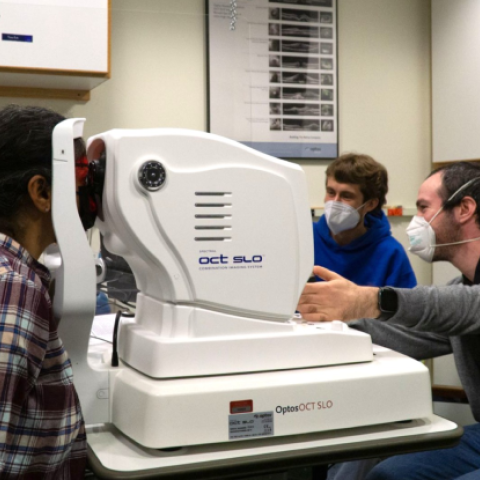

- Principal Investigator:
- Lora Likova
This NIH/NEI Clinical Trial takes a radical new multidisciplinary approach to navigation training in blindness and visual impairment. Successful navigation requires the development of an accurate and flexible mental, or cognitive, map of the navigational space and of the route trajectory required to travel from the current to the target location. The Cognitive-Kinesthetic (C-K) Rehabilitation Training that we have developed in the preceding period utilizes a unique form of blind memory-guided drawing to develop cognitive mapping to a high level of proficiency. Particular reliance must be placed on such mental maps (supported only by tactile and auditory inputs), and on the ability to use them effectively for spatiomotor control, when vision with its built-in spatial functionality is lost. There is, however, a fundamental gap in the practice of Orientation and Mobility (O&M), which is the lack of a specific emphasis on enhancement of these cognitive roots of spatiomotor activity, despite their known importance for navigation in the visually impaired.
We therefore propose a rigorous multidisciplinary approach to this issue, which lies at the intersection of the fields of spatiomotor rehabilitation, blindness assessment technologies, and brain function, each a focus of one Specific Aim. To train the spatial cognition abilities underlying successful navigation, the current proposal aims to translate the power of the C-K Rehabilitation Training, which we developed in the preceding grant period for the manual domain of operation, to the domain of navigation. The blind and visually impaired trainees will quickly learn how to generate precise and stable cognitive maps of haptically explored raised-line images or tactile maps, and how to use the formed cognitive maps to confidently guide both drawing ’hand navigation’ on a map-scale, and whole-body blind navigation on the macro-scale. Once translated to navigation, our preliminary data show that this efficient and enjoyable training will rapidly and sustainably enhance spatial cognition functions both for improved navigation performance and for enhancement of more general spatial cognitive skills.
Beyond its practical advantages, the Cognitive-Kinesthetic training will also serve as an efficient tool to drive and study training-based neuroplasticity mechanisms through a comprehensive whole-brain multimodal brain imaging platform. These neuroplastic are difficult to study properly without a rapid and effective training protocol, which has not previously been available. Taken together, the research program will overcome the relative disconnect between expanding neuroscience knowledge and approaches to practical blindness rehabilitation. The knowledge gained will in turn inform and benefit further rehabilitative developments, both in navigation proficiency and in more general cognitive function in the blind population.

